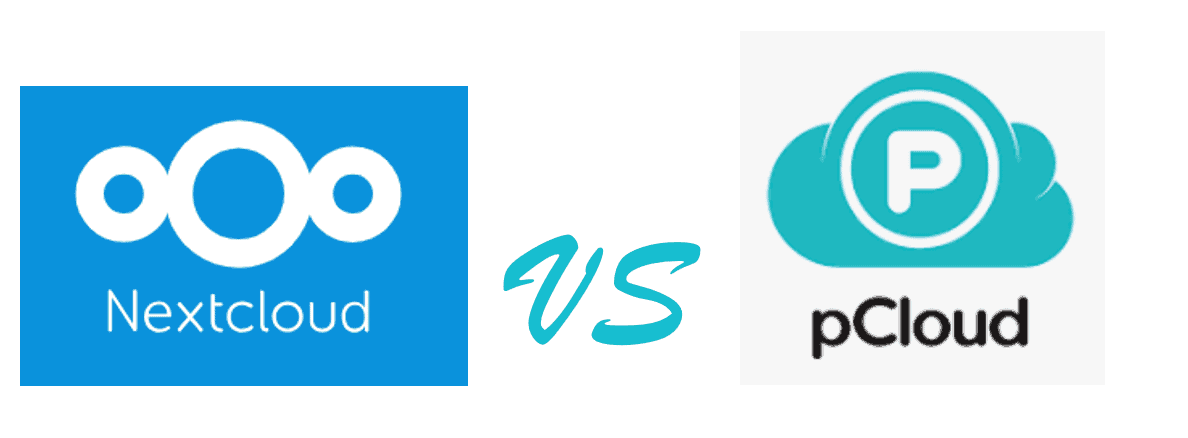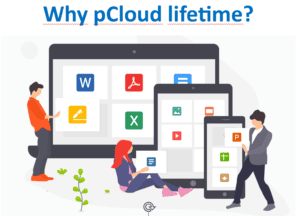Choosing the Best of Hosted vs Self-Hosted Cloud Storage Service
Dive into our comprehensive Nextcloud vs pCloud review to discover which cloud storage offers the best security, user experience, and value for families.
In today’s digital era and worried time, choosing the right cloud storage solution is crucial for managing our ever-growing trove of data. With so many options available, it can be challenging to determine which service meets your specific needs for secure, accessible, and user-friendly storage. In this Nextcloud vs pCloud Review, we delve into two popular choices, examining their features, pricing, and overall user experience to help you make an informed decision.
When you purchase through links on our site, we may earn an affiliate commission. Here is how it works.
Table of Contents
About Nextcloud vs pCloud
Nextcloud – Founded in 2016, Nextcloud GmbH is headquartered in Stuttgart, Germany, and offers its services globally. As an open-source cloud storage solution, it allows users (usually with a higher level of technical expertise and understanding) to create their own private cloud servers. With a focus on security and privacy, Nextcloud is particularly popular among users who prioritize data sovereignty. It integrates file sharing, collaboration tools, and office applications, offering a comprehensive suite for both individual and enterprise needs. Known for its flexibility and customization options, Nextcloud has garnered a dedicated user base, becoming a leading choice for those seeking a self-hosted cloud storage solution.
pCloud – Established in 2013, pCloud AG is based in Switzerland, with an additional office in the USA. This cloud storage provider has quickly expanded its reach, offering services worldwide. Known for its user-friendly interface and robust security measures (based on the well known Swiss privacy laws), including optional Zero-Knowledge Encryption, pCloud has attracted over 18 million users globally. It’s particularly renowned for its favorable lifetime subscription plans, which have disrupted the traditional subscription model in cloud storage. pCloud’s emphasis on secure and accessible cloud storage solutions has made it a popular choice among individual users and families, especially those seeking reliable and long-term cloud storage options.
Need to point out – Nextcloud vs pCloud!
We think it is important to point out that while Nextcloud is a powerful tool, it does require some technical expertise to set up and maintain, especially if self-hosting. This might be challenging for average private users without IT skills. However, with managed services, simplified installation options, community support, and a willingness to learn, it can still be a viable option for personal use. While Nextcloud offers significant benefits, it’s important to understand that Nextcloud require a certain level of technical expertise. Want more details?
The best alternative – pCloud?
If you’re attracted to Nextcloud’s data control and privacy features but feel overwhelmed by its technical demands and maybe need to chose a reliable managed hosting partner, consider pCloud. Offering a user-friendly alternative, pCloud ensures robust data privacy under Swiss laws, with much less technical setup. It’s a seamless choice for those seeking control and security without the complexity and to a cost that can be very favorable over time. Read on!
Storage Capacity – Nextcloud vs pCloud
The Cloud Storage space you choose should be like a home for your files – it needs to be spacious, expandable, and secure. Let’s compare what Nextcloud and pCloud offer in this regard.
Nextcloud offers a unique proposition: it’s an open-source platform that allows you to set up your own cloud storage on a private server. This means the storage capacity is limited only by your server’s size. It’s perfect for those who anticipate a growing need for storage and prefer a personal touch in managing their data.
pCloud, on the other hand, provides a range of fixed storage options, starting from generous free plans to substantial paid ones. For instance, their premium plans include 500 GB, 2 TB and 10TB options, catering to both moderate and heavy users. pCloud’s strength lies in its straightforward, no-hassle approach to cloud storage, making it ideal for users who prefer clear, set limits and ease of use.
User Experience & Functionality – Nextcloud vs pCloud
When it comes to cloud storage, ease of use is just as important as capacity. Both Nextcloud and pCloud shine in different aspects of user experience and functionality.
Multimedia Capabilities
In the age of high-resolution photos and videos, effective multimedia management is a must.
Nextcloud offers a powerful platform for multimedia management, with customizable add-ons for photo and video organization, and capabilities for media streaming. While it presents a wealth of possibilities, fully leveraging these features can be challenging for the less tech-savvy. Setting up and optimizing Nextcloud requires some technical knowledge, and navigating its extensive options demands a bit of a learning curve. However, for users willing to invest time in setup and familiarization, Nextcloud rewards with a versatile and personalized multimedia experience.
pCloud, with its streamlined interface, makes multimedia management a breeze. Features like automatic photo uploads and integrated media players make it a go-to for users who want simplicity and efficiency, thanks to built-in streaming support for video, music, photos and docs right from the app. The ability to share content links for direct playback also perfectly caters to families collaborating. With the pCloud integrated audio and video players, you can watch and listen to your favorite media, in almost any format. Create playlists of your favorite music pieces and listen to them on your device, any time, any where, you feel like it!

File Sharing and Collaboration
Sharing files and collaborating is a core aspect of cloud storage.
Nextcloud offers a robust set of collaboration tools, including Nextcloud Files, Talk, and Groupware. These tools integrate seamlessly, making it easy for teams to collaborate in real-time. Nextcloud also allows you to control file access and editing permissions, which is vital for sensitive projects.
pCloud, stands out for its user-friendliness, offering effortless file sharing and collaboration. Its intuitive interface allows users to easily share files and folders with download and upload links, ideal for family use. pCloud does offer the pCloud Family lifetime plan, were pCloud Encryption and pCloud Pass can be added. This makes it a superb choice for families and professionals seeking a simple yet secure platform and very cost effective solution for everyday collaboration and data management.

Mobile Access and Synchronization
In our always-on world, accessing files across devices is non-negotiable.
Nextcloud offers mobile and desktop applications that sync your data across all devices. Its flexibility in setting up a personal cloud makes it a powerful tool for those who prefer a customized setup.
pCloud‘s apps, available on all major platforms, stand out for their ease of use. Their reliable synchronization ensures that your files are always up-to-date, regardless of the device you use. For families and professionals on the go, pCloud’s straightforward synchronization offers a hassle-free experience.
Speed of Uploads/Downloads
Speed is crucial, especially when dealing with large files.
Nextcloud’s speed largely depends on the user’s server setup, which can be a double-edged sword – it allows for customization but can be inconsistent.
pCloud, with its dedicated infrastructure, generally offers faster and more consistent upload/download speeds. This makes it an attractive option for those who frequently work with large files and require quick access.
Security & Data Management – Nextcloud vs pCloud
Security and Privacy
In an era where data breaches are common, security is paramount.
Nextcloud, renowned for its open-source model, ensures transparency in security practices, a key aspect for those prioritizing safety. It offers robust end-to-end encryption, safeguarding data from unauthorized access. Compliant with GDPR, Nextcloud protects user privacy meticulously. Beyond these, it features extensive access controls, file versioning, and secure collaboration tools, making it a comprehensive solution for individuals and businesses seeking control over their data security and privacy. Its adaptability to various plugins and integrations further enhances its appeal, offering a versatile platform that can be tailored to specific security needs
pCloud This Swiss-based company ensures top-notch protection for your data, leveraging TLS/SSL channel protection and robust 256-bit AES encryption for all files. This encryption standard, widely recognized for its strength, is the same used by governments and financial institutions, offering peace of mind regarding data safety. The Swiss legal framework under which pCloud operates adds an extra layer of security, given Switzerland’s reputation for prioritizing individual privacy and data protection. This legal environment, combined with pCloud’s technical safeguards, makes it a compelling choice for users who prioritize the confidentiality and integrity of their data. It’s also compliant with various industry standards, ensuring your data remains secure and private.
Overall, pCloud’s integration of advanced encryption technologies, compliance with stringent security standards, and the backing of Swiss privacy laws make it an exceptionally secure and trustworthy cloud storage solution. For users who value their digital privacy and the security of their data, pCloud stands out as a reliable and secure option in the cloud storage market.

Zero-Knowledge Encryption – Nextcloud vs pCloud :
Nextcloud: Nextcloud provides server-side encryption, where files are encrypted on the server. This can help protect files in case of a breach on the server. However, this is not strictly “zero-knowledge” encryption, because in a typical setup, the encryption keys are also stored on the server. Zero-knowledge encryption, where only the user has access to the encryption keys, is not a native feature of Nextcloud’s standard installation. (It’s important to note that the effectiveness of this feature can depend heavily on how Nextcloud is set up and hosted. For the most secure setup in regards to implementing zero-knowledge encryption, additional configurations or third-party applications might be required. )
pCloud Encryption. pCloud offers an optional Zero-Knowledge Privacy feature with its pCloud Encryption service. This means that not even pCloud employees or any government can access your encrypted files, ensuring complete privacy. This level of security is especially important in an era where data breaches and privacy concerns are on the rise. For more info please see our post “Why pCloud Encryption“. Cost of pCloud Encryption?
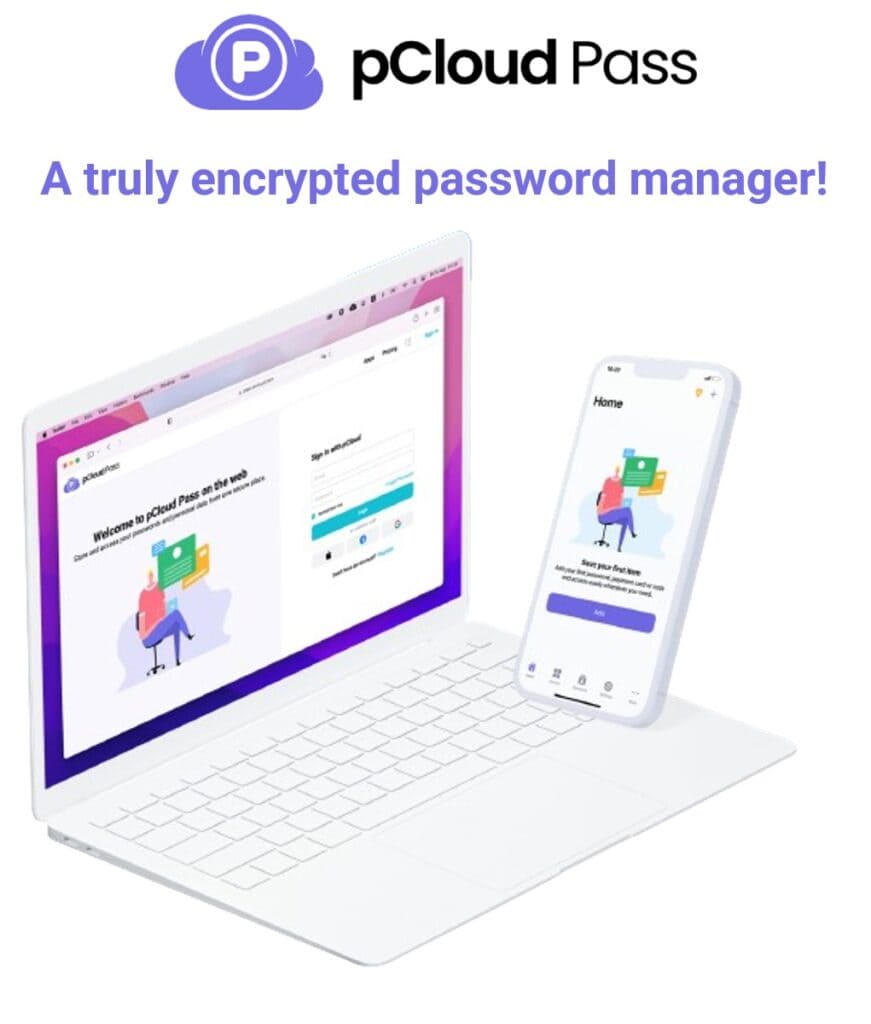
Password Management – Nextcloud vs pCloud :
Nextcloud: Nextcloud has apps like “Nextcloud Passwords” which can be used for password management. These apps provide features like password storage, generation, and sharing within the Nextcloud environment. The security level will depend on the specific app used and its configuration. (It’s important to note that the effectiveness of these features can depend heavily on how Nextcloud is set up and hosted. )
pCloud Pass: pCloud also offers another add on, the pCloud Pass. The pCloud Pass significantly enhances your cloud security experience by expertly managing your passwords. This dedicated password manager offers an extra layer of protection, securely safeguarding your login credentials. With pCloud Pass, the challenge of remembering multiple complex passwords is effortlessly resolved, as it efficiently stores and organizes all your sensitive access information in a highly secure manner. If you would like to know more about pCloud Pass, please read our blog post “Why pCloud Pass“. Cost of pCloud Pass?
Data Recovery and Versioning
Accidental deletions or changes are inevitable.
Nextcloud offers file versioning, allowing you to restore previous versions of your files.
pCloud also provides this, with extended file history options available as an add-on, ensuring you can recover older versions or accidentally deleted files.
Backup Possibilities
Both Nextcloud and pCloud offer robust backup solutions.
Nextcloud’s flexibility in server setup allows for extensive backup configurations.
pCloud offers a more user-friendly backup solution, with options to backup files from other cloud services like Dropbox, Facebook and Google Drive, consolidating their digital content in one secure location.
Sustainability – Nextcloud vs pCloud
The environmental impact of digital services is a growing concern.
Nextcloud, with its self-hosted approach, gives users control over their energy footprint.
pCloud, while not self-hosted, is transparent about its energy consumption and is committed to reducing its environmental impact.
Cost and Subscription Plans – Nextcloud vs pCloud
Cost Analysis
Nextcloud’s self-hosting model can be initially more expensive but cost-effective in the long run. The Nextcloud software itself is free as an open-source platform, the total cost of ownership is very hard to estimate since the cost of Nextcloud can include hardware, hosting, support, and maintenance expenses, depending on the specific setup and requirements.
pCloud stands out with its structured and user-friendly storage options. It starts with a free version, offering up to 10GB of storage, ideal for basic usage. For more extensive needs, pCloud offers monthly or yearly subscription plans, with storage levels ranging from 500GB at USD 4.99 to 2TB at USD 9.99, and the ability to add more storage over time, even up to 10TB. Adding to its appeal, pCloud provides optional add-ons like pCloud Encryption and pCloud Pass for enhanced security and password management, which can be included in any subscription plan. This tiered approach allows users to scale their storage needs and security features according to their requirements
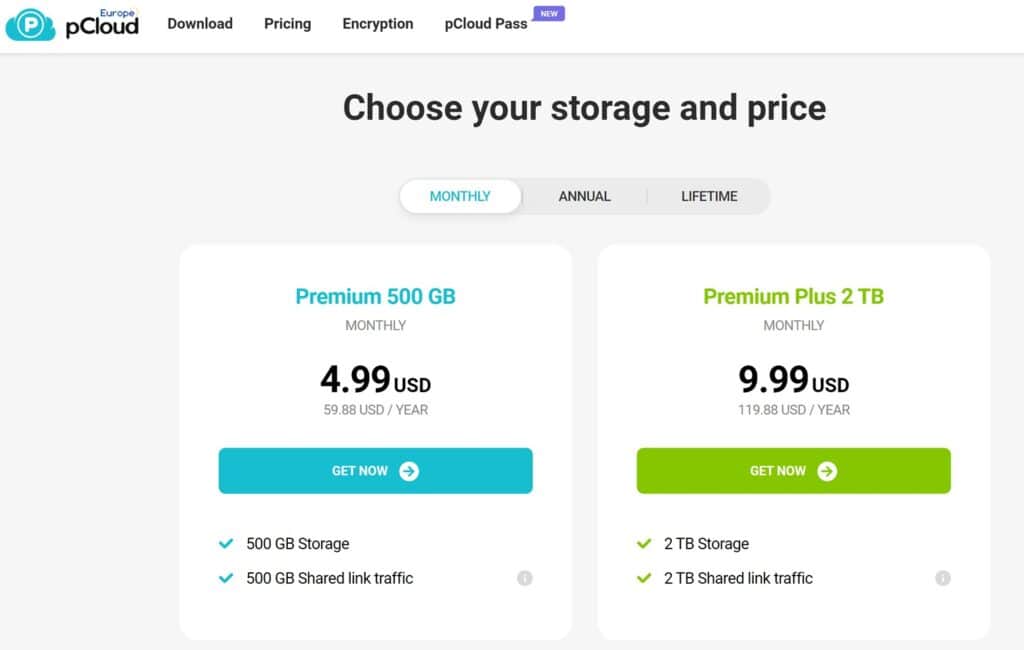
Family Plans:
Nextcloud, being more customizable, can be adapted for family use but doesn’t have specific family plans.
pCloud Family takes the lead, offering dedicated pCloud family plans starting from 2TB and can be shared with up to 5 members. Whether opting for regular subscriptions or the lifetime option, pCloud’s family plan can be very cost-effective over time. This plan is ideal for families seeking a unified, user-friendly secure solution that can be shared but also ensures that each member its own private storage area. One can also add pCloud Encryption and pCloud Pass to the pCloud Family plan making it a perfect choice to secure a long term solution for both individual and family use.
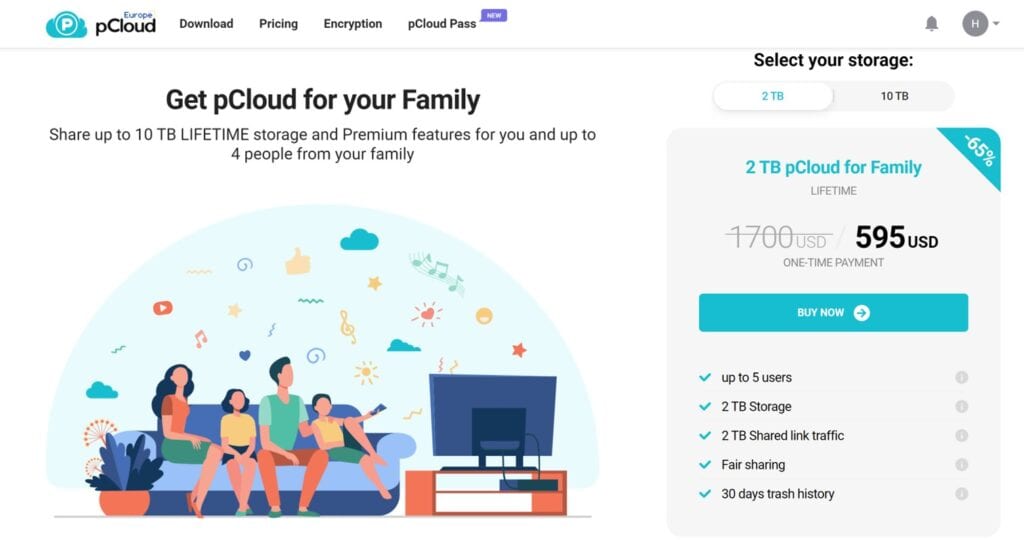
Long-term Lifetime Commitment
Both services offer options for long-term commitments.
Nextcloud’s open-source model can be a long-term investment in your digital infrastructure.
pCloud’s distinctive lifetime plans stand out in the cloud storage market, offering users a one-time investment for long-term storage needs. This cost-effective approach eliminates recurring subscription fees, making it an economical choice for those seeking a permanent cloud solution. With these plans, users gain access to secure, reliable storage, and all of pCloud’s robust features for a lifetime, ensuring a hassle-free, sustainable digital storage solution. It’s an ideal option for individuals and families looking for a straightforward, one-off payment to secure their digital assets for years to come.”
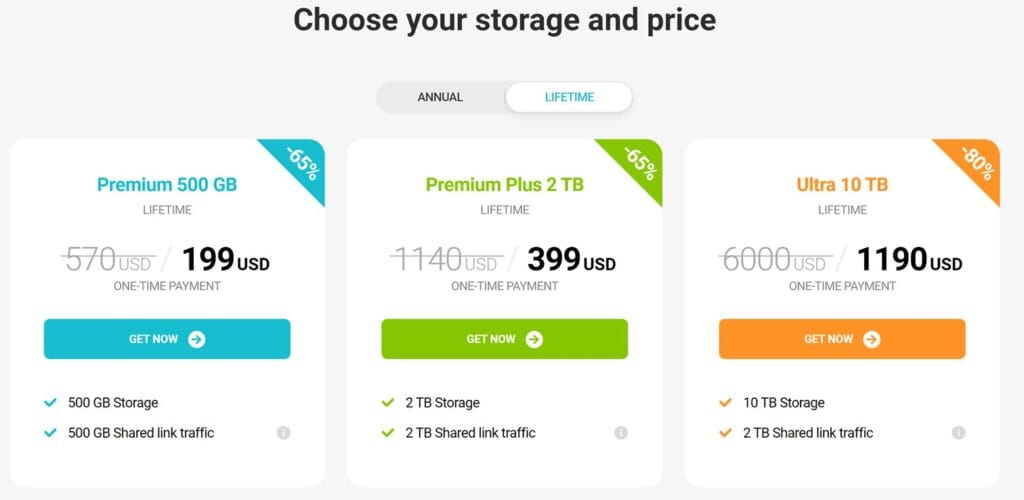
Conclusion – Nextcloud vs pCloud
In concluding the comparison between Nextcloud and pCloud, both platforms excel in their respective areas, catering to different user needs. Nextcloud is a fantastic choice for those with the requisite technical knowledge or resources to invest in hosting and setup. Its robust customization options, extensive multimedia capabilities, and potential for a highly personalized experience make it an excellent choice, particularly for tech-savvy users or organizations seeking a powerful, self-hosted cloud solution.
On the other hand, pCloud emerges as a highly appealing alternative, especially for those who find Nextcloud’s technical demands daunting. Its simplicity, combined with a range of flexible storage options, including the cost-effective and unique Lifetime plan, makes it an attractive choice for individual users and businesses alike. pCloud’s straightforward approach, bolstered by additional security features like pCloud Encryption and pCloud Pass, ensures a user-friendly and secure cloud storage experience.
Both platforms offer distinct advantages, making the choice dependent on individual preferences, technical comfort level, and specific storage requirements

Need to point out – Nextcloud vs pCloud! – Extended!
Nextcloud require a certain level of technical expertise:
- Initial Setup: Setting up Nextcloud requires some technical knowledge, such as understanding how to run a server, configure network settings, and install software. This might be challenging for users without a technical background.
- Maintenance and Updates: Regular maintenance, such as applying security patches and updates, is crucial to keep the system running smoothly and securely. This also requires a certain level of technical know-how.
- Hosting Requirements: Self-hosting means you need to have a server (which could be a dedicated server, a home server, or even a personal computer) and a reliable internet connection. Setting up and managing a server can be complex for non-technical users.
- Data Backup and Security: Users are responsible for their own data backups and security measures. Understanding how to effectively backup data and secure a network is important to prevent data loss and security breaches.
Nextcloud – For non-technical users:
There are a few approaches to make using Nextcloud more feasible:
- Managed Nextcloud Services: Some companies offer managed Nextcloud hosting. They handle the technical aspects of running and maintaining the server, making it much more accessible for non-technical users.
- User-Friendly Installation Options: There are tools and guides available that simplify the installation process. For example, NextcloudPi is a project that aims to make it easier to run Nextcloud on a Raspberry Pi, which can be a more user-friendly option for personal use.
- Community Support: The Nextcloud community can be a helpful resource for troubleshooting and advice. There are forums and documentation available to assist with common issues.
- Learning Opportunity: For those interested in learning more about IT and server management, setting up and maintaining Nextcloud can be an educational experience.
